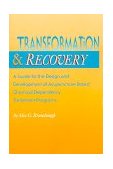Resources for Acupuncture in Chemical Dependency Treatment and Recovery

Is acupuncture compatible with 12-Step or abstinence-based treatment approaches?
Acupuncture benefits clients in any treatment or recovery setting by reducing stress and other symptoms of acute and post-acute withdrawal.
It is interesting to note that 12-Step programs - while ultimately subscribing to life-long abstinence as the solution to chronic alcoholism or other drug addiction - are remarkably tolerant of relapse. People may "chip" 12-Step programs - experiencing multiple relapses over extended periods of time - before finally "getting it." And they are always welcomed back regardless of how recently they used. In fact, most 12-Step groups ask people to leave the meeting based only on behavior rather than on the person's state of sobriety.
Acupuncture allows the outpatient treatment program to adopt this same flexibility. When provided daily in a barrier-free, outpatient setting, acupuncture allows the program to adapt a philosophy of "first things first." For example, it is the policy of many clinics to encourage clients to "come as clean as they can." Multiple drug users may be encouraged to take things "one step at a time" (i.e. a "heavy drinker" concerned about their excessive use of marijuana might be encouraged to just work first on the latter).
Those who subscribe to abstinence-based approaches for chronic alcoholics and drug addicts have significantly increased their ability to attract and engage clients in this manner in good conscience, because chronic drug use and daily acupuncture are ultimately and intrinsically incompatible. That is to say, a chronic drug user who receives acupuncture every day will eventually either stop their drug use or stop coming for acupuncture. If the latter occurs, the outcome will have been that - like the 12-Step program - the person has been exposed to something to which they know they can return the next time they feel in need of help.
Many abstinence-based programs who have incorporated acupuncture also find that they can add harm-reduction components. For example, one abstinence-based program provides on-site AIDS testing, and another provides free consultations for homeless persons with a public health nurse at the same time that acupuncture is being provided, thus providing an accessible entrée to recovery support services that would not otherwise be available to these individuals. Other programs have added HIV prevention street outreach and participated in needle exchange programs, inviting people to visit their acupuncture clinic to help reduce stress and to get condoms, bleach, and public health information (see also compatibility with harm reduction).
Click Here for more about how acupuncture interfaces with 12-Step recovery!
previous
- Read FAQs in Sequence - next
Index of Articles - Links - Home
Scroll down for more FAQS
How many clients can be treated at once?
How often do clients need to be treated?
How long to clients have to keep having treatments?
Does it matter what time of day the acupuncture is provided?
What
national organizations support acupuncture in treating addiction? What
resources are available to support us if we decide to do it?
Does
the acupuncture program have to include herbs or nutritional supplements?
What
is the history of how acupuncture began to be used in chemical dependency
treatment?
What
does the acupuncture clinic look like exactly?
How
much space and extra equipment will we need to do it?
How
do we clean or dispose of the needles after they are used?
How
does acupuncture fit with drug testing?
How
do we find and train people to do the needling?
Could
we just try it experimentally to make sure it's a good fit for us?
What
technical assistance will be required to start and maintain an acupuncture
component?
Is
it compatible with harm reduction?
Is
it compatible with 12-Step or abstinence-based treatment approaches?
Is
it appropriate for mandated or court-referred clients?
Is
it appropriate for adolescents?
Is
it appropriate for pregnant women?
Is
it appropriate for people with co-morbid psychiatric problems?
Is
it appropriate for people with HIV/AIDS?
Is
it appropriate in methadone programs?
Is
it appropriate in residential programs?
What
training is required for current program and administrative staff?
What are the steps we should take to add an acupuncture component?